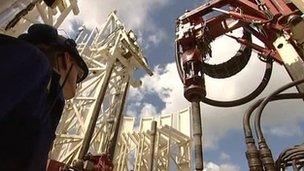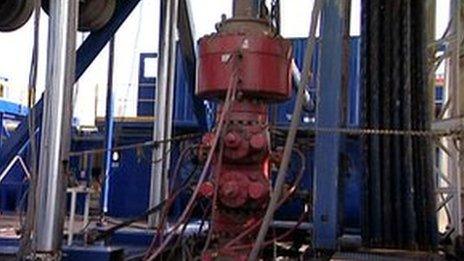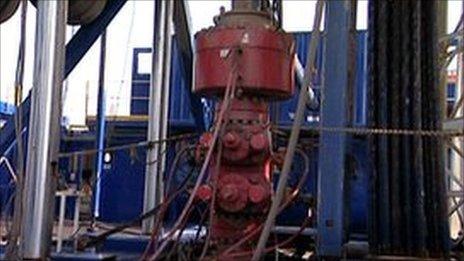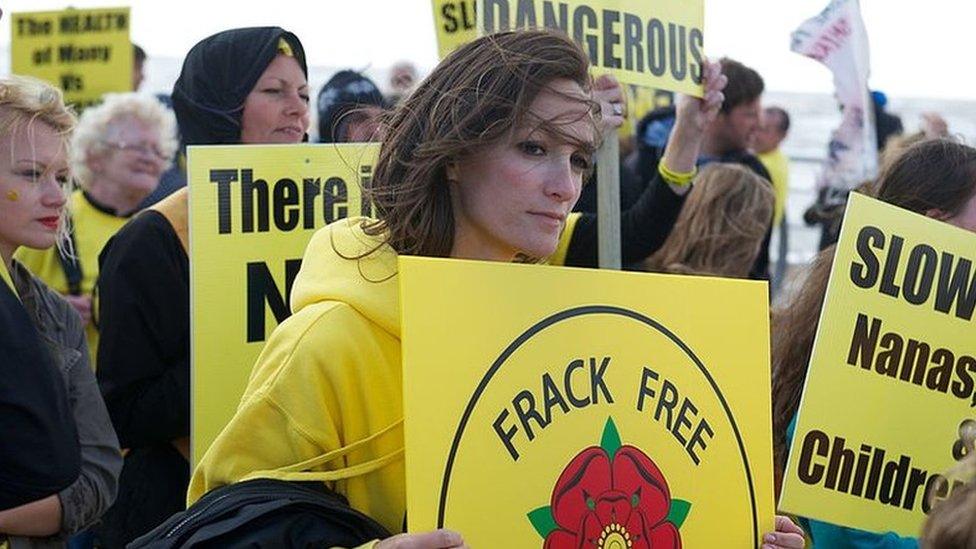Fermanagh shale gas 'could supply Northern Ireland'
- Published

The gas is extracted from shale rock through hydraulic fracturing, or fracking.
There could be enough natural gas trapped within shale rock in County Fermanagh to supply all the gas Northern Ireland needs for decades.
The claim has come from the exploration company with a licence for the area.
Tamboran Resources has spent the last year analysing surveys and taking rock samples.
It now says preliminary results show there could be enough gas to guarantee security of natural gas supply for Northern Ireland over 50 years.
The region would even become a gas exporter, they claim.
"We're 100% certain there is gas there. We're 90% certain that we'll get it out in the sort of quantities we're talking about," said environmental director Tony Bazley.
He said the discovery could lead to 600 direct jobs by 2025 and the company will seek engineering solutions and other services locally which could lead to another 2,400 jobs.
Tamboran also projects tax revenues for the government of up to £6.9bn.
But the most significant claim is that the shale gas deposits may be large enough to provide Northern Ireland with all the gas it needs for decades, even becoming an exporter.
Currently all Northern Ireland's natural gas is imported.
In the United States, a shale gas production boom has reduced natural gas prices by half to a 10-year low.
The process used in capturing the gas from the shale rock is hydraulic fracturing, known as fracking.
It involves drilling horizontally into the rock, forcing sand and water underground to cause tiny fractures that release the gas from the shale.
It is a not a new method but has only become economically viable due to the increased cost of gas in recent years.
Minor earthquakes
However it is a controversial process. In November another company, Cuadrilla, admitted that its drilling was the "likely cause" of minor earthquakes in Lancashire.
And in the US, where the process is most advanced, there have been cases of water pollution linked to fracking.
Tamboran said it would minimize any such risks with a seismic survey to give a detailed three-dimensional picture of what it's drilling into and it also says it will not use any chemicals in its fracking process.
Chemical solutions are often added to lubricate the drilling process and give extra power to the pumped water at great depths. But Tamboran said it would not be drilling deep enough to require any chemicals.
The company wants to proceed to a full environmental assessment before drilling two test holes.
If those test sites prove successful it hopes to convert them into production by 2015.
At any one time it could have up to three four acre sites producing gas. As one site becomes exhausted it is closed down and another opened elsewhere.
One of the economic advantages of the Northern Ireland deposits is the relative proximity to the gas pipeline and the apparent depth of the shale.
Last December, Northern Ireland Assembly members called for a stop to fracking.
They backed a call for a moratorium on onshore and offshore exploration and the withdrawal of licences by 49 votes to 30.
Sinn Fein's energy spokesman, Phil Flanagan, said there was a "huge groundswell of public opposition to these plans".
He questioned the length of time jobs would be created for and the effect drilling would have on the local environment.
"The real potential for job creation and economic growth in Fermanagh and Leitrim surely lies in the development of clean, renewable sources of energy," he said.
"The fact that many other countries have moved to slow down or even stop the use of fracking should be a warning call to ministers on this island.
"We should at the very least follow their approach and call a halt to this process until all the relevant environmental and economic consequences have been taken into consideration."
- Published6 December 2011
- Published11 January 2012

- Published24 January 2012

